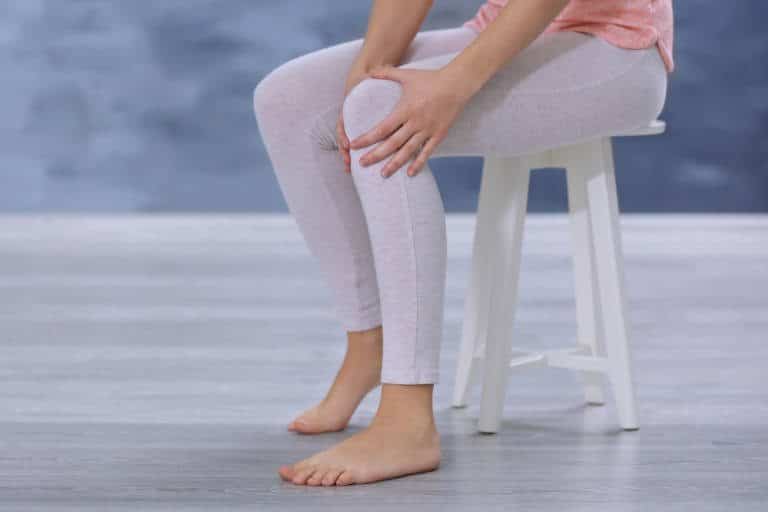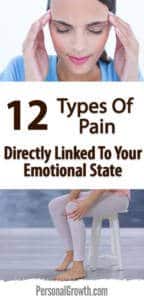

Many health conditions cause occasional or chronic pain. You may notice that people who are in pain are not always happy or enjoyable to be around. Imagine living your life plagued by constant pain, and it is easy to see why they may feel that way.
However, you might not have any health problems and still experience pain. Researchers are finding that certain emotions can lead to pain. According to the studies, stress leads to inflammation that can cause such pain. The type of pain you are experiencing may be telling you something about yourself. Consider the following.
People who suffer from headaches or migraines may be experiencing the pain due to the stresses that crop up with daily life.
Maybe that’s screaming kids, a long commute or a high-stress job. Whatever it is, having something that takes over your mind and thoughts can certainly lead to pain in your head, whether it’s minor or major. In these cases, taking a break to relax and unwind is helpful. Try a cup of tea or a warm bath.
Experts say that neck pain could be a result of your inability to forgive someone, perhaps even yourself.
You might be angry or hurt by someone and holding those emotions in your neck, which can eventually lead to strain and pain. When this happens, it’s a good idea to work through what’s bothering you so that you can come to a healthy resolution that eases your pain.
When you feel pain in your shoulders, it could be because you are struggling with something emotional. This could be something that has to do with work, your family, your friends or anything else. If you feel like the weight of the world is on your shoulders, it could be that you need to slow down and assess what’s going on in your life.
Get a massage and have a sit-down talk with whoever is causing your angst. You’ll feel a burden lifted almost immediately.
Pain in your upper back is likely due to feelings of being alone. Do you have a small support network or none at all? If so, the pain in your back may be due to the emotions this can lead to. If you feel like you’re all alone in the world, you can ease this pain by making new connections or reconnecting with people from your past.
Learning to communicate in a healthy way can also help.
Experts say that people with a lot of lower back pain could be having financial troubles. The way you carry yourself when you are worried or stressed out about money could be the cause of your pain. Seeing a financial planner or creating a budget are two easy ways to ease the worry and the pain at the same time.
If you lack a support network, now is the time to build one. Look for groups in your area, take a class, or call an old friend and reconnect with each other.
You might attribute elbow pain to strain from using your laptop or tablet too much. In reality, it could be due to resisting life changes. Experts say that if you fight change, you probably hold your arms very stiffly, which is a surefire way to have elbow pain. Learning to be more flexible is a great way to ward off this type of change.
Seeing a therapist may be necessary to help you learn to do this in an effective way.
When you have pain in your hands, it could be signaling to you that you need to reach out to friends and family more often.
Because you use your hands to make connections, the pain could crop up when you haven’t reached out in a while. Make a dinner or coffee date and you’ll probably feel better pretty quickly.
If you’re afraid of moving on to new things or are resisting a big change, you could be having hip pain.
Since your hips are what help you move forward, refusing to do so can leave them sore and painful. Trust your gut when it comes to new things, and use a pros and cons list to help you make tough choices in your life.
Experts caution that knee pain could be because you have a big ego. If you like to bring all the attention to yourself and feel like you are better than others, you can sometimes blame pain in your knees on that. Try volunteering, which is a humbling experience and an easy way to look beyond you and see a new perspective.
See a therapist if you have trouble with this; it can be difficult.
When you experience pain in your calves, you could be feeling jealous or resentful of other people. If that’s the case, now is the time to stop comparing yourself to others and focus on what you love about yourself and your own life. Try to stay away from social media, which can make jealousy and resentment even worse.
Remember that this is a highlight reel and not a real picture of someone else’s life.
Are you forgoing pleasurable experiences or treating yourself? That could be why your ankles hurt. Experts say you should always take time to nurture yourself and take care of you. That might mean making time for a bath at the end of the day, having dinner with a friend or seeing a new movie.
When you feel loved and cared for, you might notice that pain in your ankles going away.

Foot pain can sometimes be attributed to depression. Depression is a potentially scary mental health condition that requires treatment. Therapy and medication are your best bet for battling the condition. You may notice that once you treat the depression, the foot pain disappears too.
If you have pain due to an injury or health problem, it’s very important to see a doctor regularly. Don’t attribute the pain to your emotions unless there is no other explanation. Making an appointment with a mental health specialist is a good way to get to the root of the problem and find out what’s causing your pain.
Once you do that, it’s easier to treat the pain and what’s causing it at the same time. Of course, if your pain doesn’t go away, it’s vital to see a physician to rule out another problem or health issue. Both over the counter and prescription pain medications are useful, but should be taken in the proper dosages for the best results.

